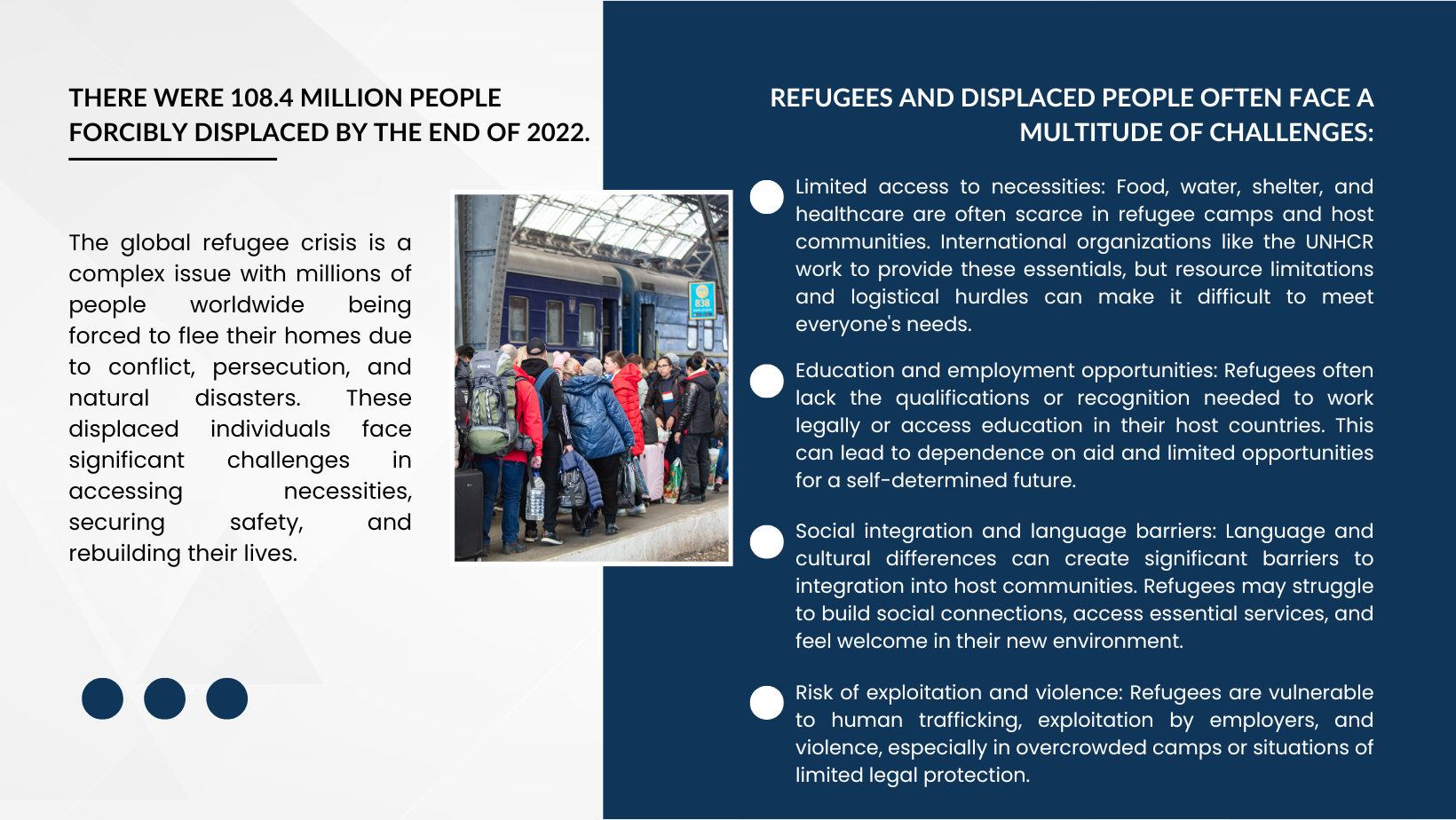
25 Apr Protecting the Rights of Refugees and Displaced People: Challenges and Solutions
There were 108.4 million people forcibly displaced by the end of 2022. In recent times, global migration has highly increased with the plight of refugees– individuals forced to flee their homes due to a confluence of factors that threaten their very existence. The global refugee crisis is a complex and pressing issue with millions of people worldwide being forced to flee their homes due to conflict, persecution, and natural disasters. These displaced individuals face significant challenges in accessing necessities, securing safety, and rebuilding their lives.
Individuals targeted for their race, religion, ethnicity, political beliefs, or sexual orientation remain at risk of either losing their lives or leaving behind everything they know for a chance at survival. Similarly, as the climate crisis tightens its grip on our planet, extreme weather events and natural disasters are uprooting entire populations, leaving them with nothing but the lingering trauma of losing their homes and livelihoods.
Protecting refugees’ rights is both a moral and practical imperative. It is important for the international community to address the root causes of displacement and ensure the fundamental rights of these most vulnerable populations are protected. Fleeing violence and persecution, refugees are often in extremely vulnerable positions. Recognizing their fundamental human rights ensures their safety and dignity. By innovating solutions and working towards a world where displacement is minimized, we can build a more stable and prosperous future for all.
Challenges on the Ground
Refugees and displaced people often face a multitude of challenges:
- Limited access to necessities: Food, water, shelter, and healthcare are often scarce in refugee camps and host communities. International organizations like the UNHCR work to provide these essentials, but resource limitations and logistical hurdles can make it difficult to meet everyone’s needs.
- Education and employment opportunities: Refugees often lack the qualifications or recognition needed to work legally or access education in their host countries. This can lead to dependence on aid and limited opportunities for a self-determined future.
- Social integration and language barriers: Language and cultural differences can create significant barriers to integration into host communities. Refugees may struggle to build social connections, access essential services, and feel welcome in their new environment.
- Risk of exploitation and violence: Refugees are vulnerable to human trafficking, exploitation by employers, and violence, especially in overcrowded camps or situations of limited legal protection.
Innovating to Zero: Best Practices from Around the World
Despite the challenges, there are inspiring examples of innovation happening around the world:
- Cash-based interventions: UNHCR’s iris-scanning technology allows for secure cash distribution in refugee camps, empowering refugees to choose how they meet their needs.
- Education through technology: The “School in a Box” program by Education Above All provides educational resources for displaced children in remote areas using tablets and solar chargers.
- Skills development and entrepreneurship: Spark is a Jordan-based NGO providing refugees with training, mentorship, and co-working spaces to launch their own business.
- Resettlement opportunity: Canada offers resettlement opportunities and prioritizes refugees fleeing violence and persecution. Canada has a well-established system for integrating refugees, with pathways to citizenship.
- Open door policy: Uganda maintains a progressive open-door policy for refugees, integrating them into communities and allowing them to work freely. Uganda’s approach is seen as a model for refugee protection in Africa.

Conclusion
The global refugee crisis is a complex humanitarian issue with far-reaching consequences. By embracing innovation, international cooperation, and prioritizing conflict prevention, we can create a world where displacement becomes the exception, not the norm. It is important that we ensure that everyone has the right to a safe and dignified life, no matter where they come from. By understanding the challenges faced by refugees and the importance of protecting their rights, we can work towards a more just and peaceful world for everyone.
Blog by Shreya Ghimire,
Research Analyst, Frost & Sullivan Institute


Sorry, the comment form is closed at this time.